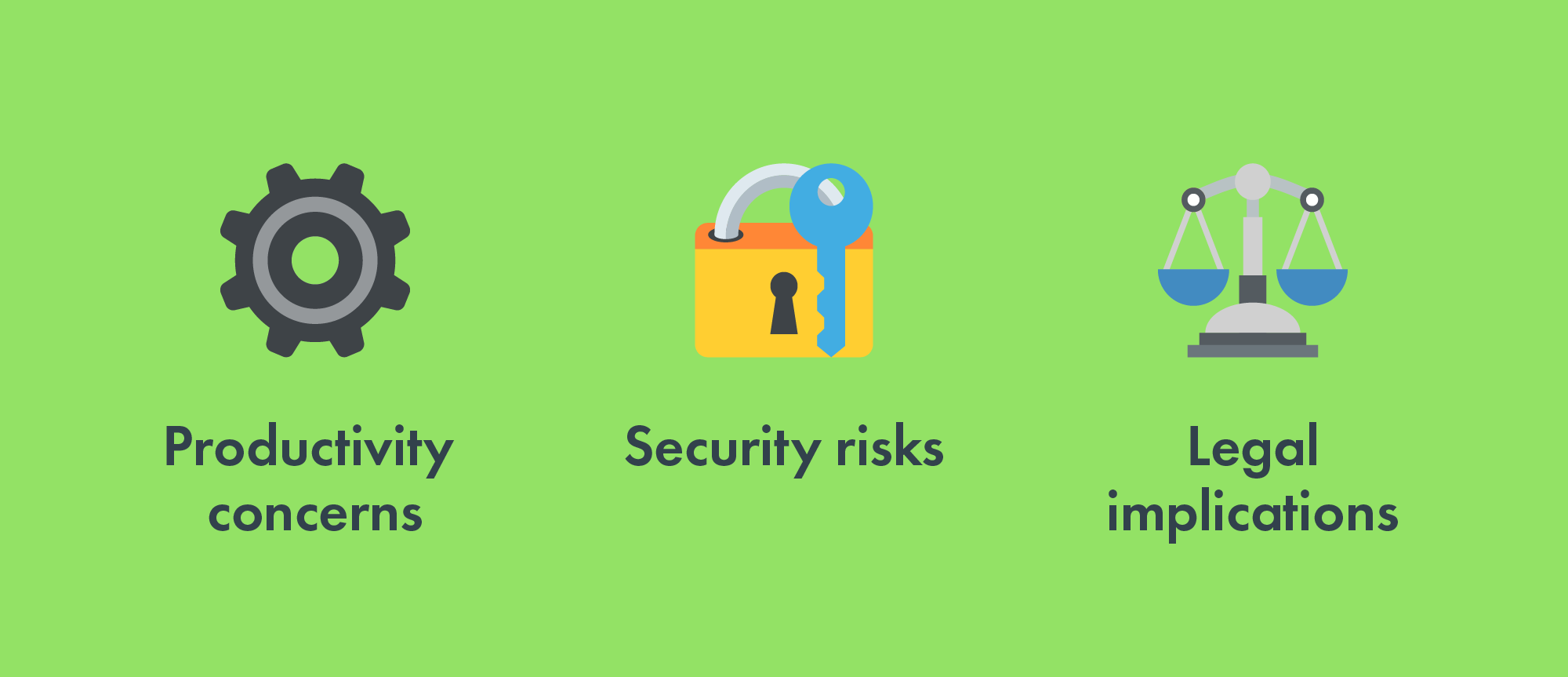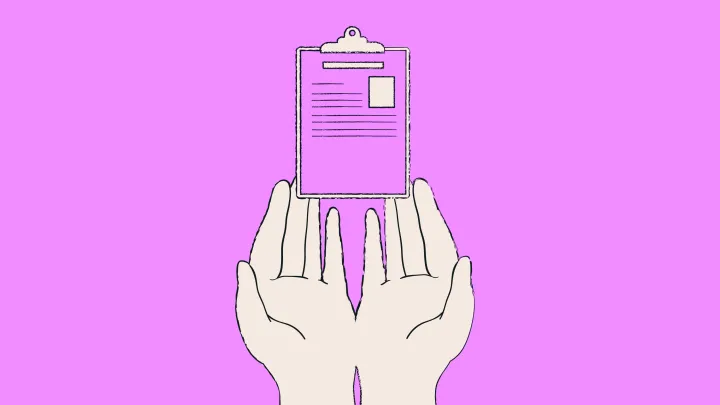Mobile phone policy: do you really need one? + free template

It’s a digital age cliche to say that we have our mobile phones glued to our noses. Mobile smartphones have become an extension of ourselves, like a second pair of eyes and ears.
I love my mobile phone. You probably do too. Who doesn’t?
Regardless, the use of mobile phones has implications for the modern workplace, and not all of them are good.
Yes, they can enable us to be more productive and better at our jobs. However, they can also be extremely distracting, and they can pose a security risk if you don’t have the right safeguards in place.
Having a mobile phone policy to account for these issues is going to be helpful, if not essential. That’s especially the case if you’re experimenting with a remote work or hybrid model.
I’d like to offer this guide to making your own mobile phone policy, why having one is important, and how to put it into action. You can also have a look at our mobile phone policy template here below, to take inspiration to draft your own.
Mobile phone policy template
Mobile phone policy template for [Your Company Name]
At [Your Company Name], we understand the importance of balancing productivity with the flexibility to use mobile phones for personal needs. Our mobile phone policy aims to provide guidelines that ensure a secure, efficient, and respectful work environment.
Purpose and scope
This policy outlines the acceptable and unacceptable use of mobile phones during work hours, whether the device is company-provided or personal. It applies to all employees, contractors, and visitors within [Your Company Name]'s premises.
Acceptable and unacceptable use
- Acceptable use:
- Brief personal calls or texts.
- Emergency situations.
- Use of productivity apps.
- Unacceptable use:
- Excessive personal calls or texts that disrupt workflow.
- Use of social media unless it's work-related.
- Any form of harassment or illegal activity.
Security measures
- Enable two-factor authentication on all company-provided mobile phones.
- Do not store sensitive company information on personal mobile phones.
- Use secure Wi-Fi networks when accessing company data.
Consequences for policy violations
- First offense: Verbal warning.
- Second offense: Written warning.
- Third offense: Disciplinary action, up to and including termination.
Acknowledgment form
I, [Employee Name], have read and understood the Mobile Phone Policy of [Your Company Name] and agree to adhere to the guidelines set forth herein.
Why do you need a mobile phone policy?
So why do you need your own mobile phone policy in the first place?
There are a few reasons why you’ll want to set guidelines for mobile phone usage at work.
1. Productivity concerns
For one thing, mobile phones can distract you from your work tasks. A quick glance to check your WhatsApp messages can easily turn into 30 minutes of doomscrolling. It’s happened to all of us.
Indeed a study about how unregulated mobile phone use can cause frequent interruptions at work. It can break your focus, and impact your overall productivity.
2. Security risks
Mobile phones are essentially little computers, and they often have access to all of your company’s emails, files and sensitive data.
Imagine the catastrophe that could happen if it fell into the wrong hands.
A well-made mobile phone policy will account for these potential risks and solve them with measures like two-factor authentication.
3. Legal implications
The use of mobile phones in the workplace can also open up a legal can of worms if they’re not regulated.
Data breaches, unauthorised access, and sensitive information falling into the hands of bad actors like scammers and cyber-criminals pose real problems. They have cost other companies millions of dollars in fines and lawsuits.
A mobile phone policy mitigates these risks and takes steps to make sure that doesn’t happen to you.

Types of mobile phone policies
What works for one company might not necessarily work for you, and vice versa. I’d like to offer a few different types of mobile phone policies and give you an idea about how you might go about it.
Strict policies
For high-security environments like finance or healthcare, a more rigid mobile phone policy may be appropriate. This is also a good idea for more customer-centric roles.
Flexible policies
Having a more flexible and loose mobile phone policy is common in startups and tech companies. In these kinds of environments, the company puts more trust in employees to manage their time.
This is also a great way to make sure you apply your diversity and inclusion policy into the fold – think about people who have families or who are carers and actually need a mobile phone near them.
Hybrid policies
You can also choose to implement a mix of flexible and strict policies and take the middle ground. In this method, you would tailor the mobile phone policy to the role and their responsibilities, rather than the company at large.
How a mobile phone policy works at Charlie
If your team works remotely, it may not make much sense to restrict the use of mobile phones.
Take Charlie for example. At Charlie, we work on a hybrid model (check out our hybrid working policy template for more information). We can work from wherever we like in the UK, but there’s also an office available to anyone who wants to make use of it. In practice though, most of our team works from home.
Even before the pandemic, one of our core values has always been that of ownership. We trust our team members to do their best work and follow through on their obligations. It’s one of the things that makes Charlie a good place to work.
This comes with a few stipulations, however:
- Team members are asked to use their phones and work computers for work-related activities. Checking your WhatsApp messages is one thing. Browsing content that’s racist, violent or pornographic is right out.
- Team members are asked only to visit websites they know and trust. As a rule of thumb, we avoid websites that aren’t encrypted.
- Team members are expected to keep their work equipment safe, including their phones, and especially if they store work data. This means laptops are kept in a safe, secure location at home, and we don’t leave our phones and laptops unattended while travelling. Remember that it is a legal requirement for your business to have a data protection policy in place.
How to implement a mobile phone policy
Hybrid work did the trick at Charlie, but how a mobile phone policy worked for you may be quite different.
Drafting your mobile phone policy will take some planning, communication, and training. Here’s how I advise that you go about it.
Key components of an effective mobile phone policy
A useful and effective mobile phone policy will generally have the same core elements:
1. Purpose and scope: Define why the policy exists, and who it’s for. Is it to minimise distractions, or enhance productivity? Does it apply to everyone, or are there exempt employees?
2. Acceptable and unacceptable use: Be very clear on what is and isn’t acceptable mobile phone use at your company. Is personal browsing ok during meetings? Which kinds of websites are off-limits in all situations?
3. Security measures: Implement security protocols like two-factor authentication (2FA) for things like accessing company emails.
Drafting the mobile phone policy
With all that in mind, it’s time to get down to business and make your work mobile phone policy.
Rope your leadership team and people managers into the discussion so they can have a say in what the policy says. This makes sure the policy is comprehensive and ticks all the boxes.
Communicating the new mobile phone policy to the team
Once you make your policy, it’s time to ensure everyone understands the rules and is on board.
Use team meetings, emails, and platforms like Slack to have internal discussions about the rules regarding mobile phone use at work.
Then, make sure your policy is stored in a place where everyone can find it, like your company drive or HR software. With CharlieHR, you can store your whole employee handbook, complete of all your policies, on the platform — so anyone in your team can browse your HR policies at any time.

Training and acknowledgement
It starts with communication, but it doesn’t end there. It’s a good idea for you to host training sessions about the policy, require employees to sign an acknowledgement form, and get everyone on the same page about the policy.
The training doesn’t have to take long. Most issues can be covered in a 30-minute conversation with everyone on the same call.
Common questions about mobile phone policies
Mobile phones have become so central in our daily lives that banning their use entirely would be most unwise. That is a surefire way to breed anger and resentment in the people you rely on to keep the lights on.
I’d like to answer some common questions about mobile phone policies to address potential issues you may face.
1. How do you enforce a mobile phone policy?
Regular audits and employee training can help your employees stay on board concerning appropriate mobile phone usage. Review your policies on an ongoing basis to make sure they’re being followed, and pivot when necessary.
2. What if an employee violates the policy?
Start with a conversation with the employee, a verbal or written warning.
If the problem persists, escalate the disciplinary actions. You can even decide on termination if the violation is severe. The important thing is to have a clear procedure in place.Need help dealing with a complex employee issue? Get one-to-one support from a qualified HR advisor.

3. How often should you review your mobile phone policy?
An annual review is good practice to audit your mobile phone policy, or even sooner if there are significant changes in your workplace.
Start a free trial of CharlieHR today, and be well on your way to a more secure and productive workplace.



